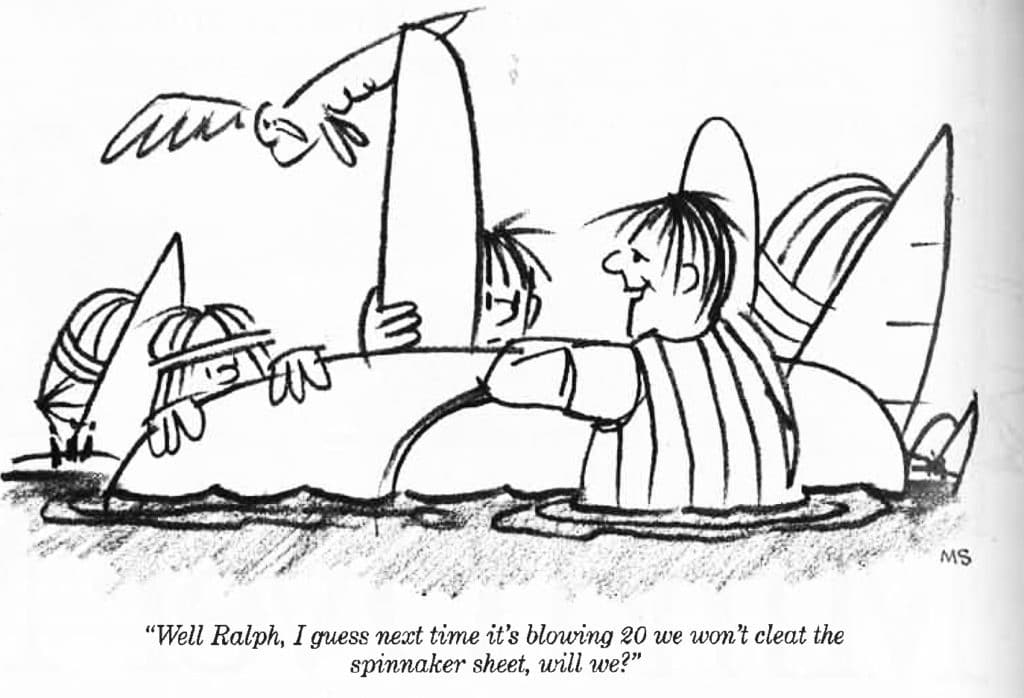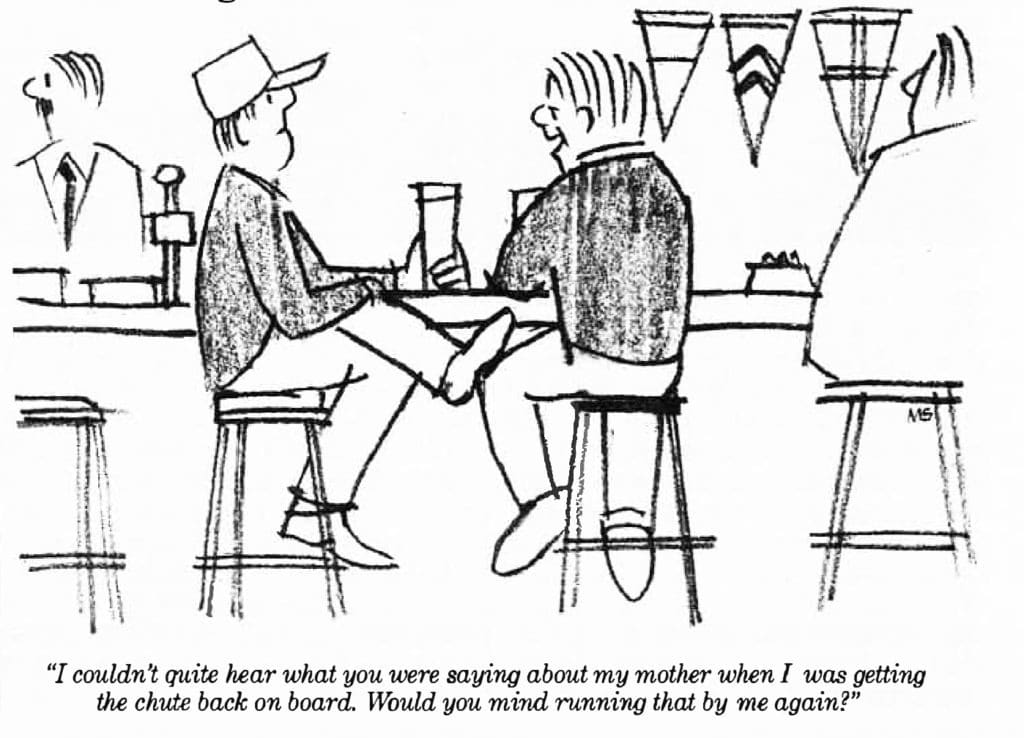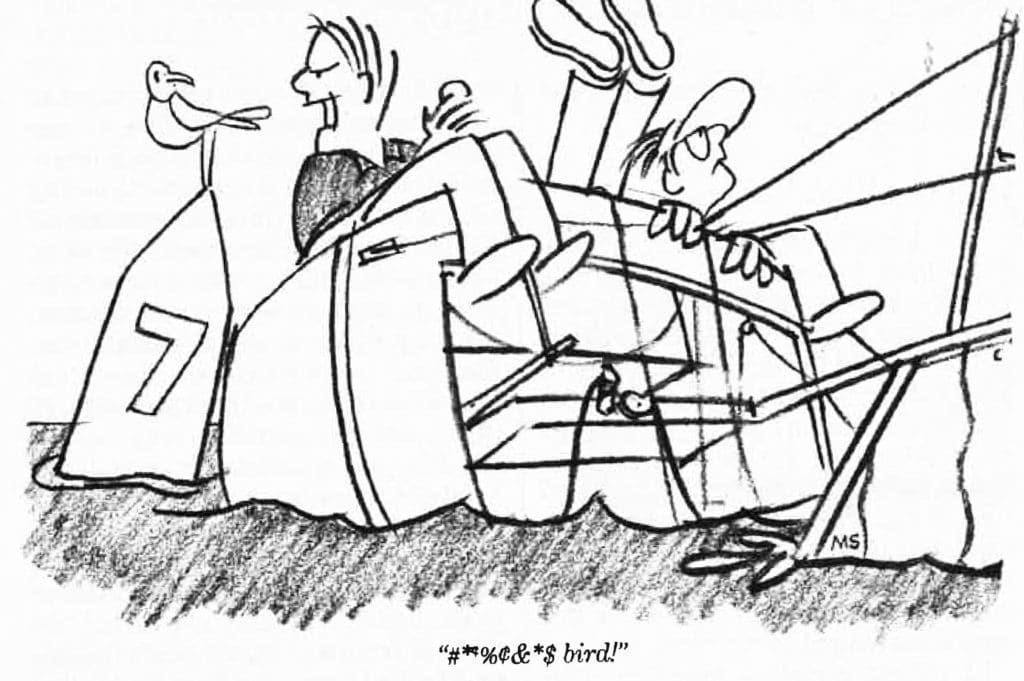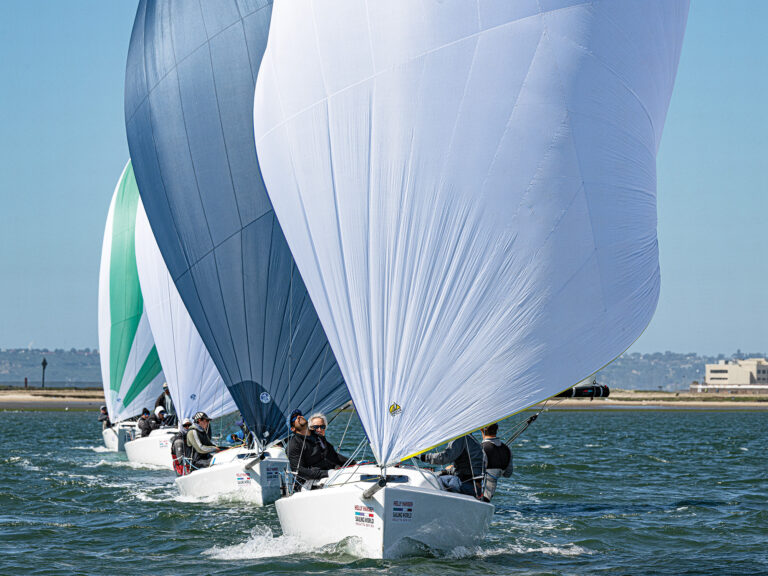From Yacht Racing/Cruising, June 1982

Sailboat racing is supposed to be fun, and it usually is. There are the thrills of screaming high-speed reaches, the challenges of figuring out a shifty weather leg, the rewards of races sailed nearly to perfection, and the good times with friends both on and off the water. There are also, unfortunately, times that feel less than rewarding—when your skipper gets mad and starts yelling, when you take a flyer out of frustration and end up way behind, or when the post-race party loses its appeal because you’re depressed. Such feelings can make the sport seem more like a chore than an uplifting experience. When this happens, the sailor’s challenge is to turn these negative experiences into positive ones, and to learn from them so they won’t get in the way of doing well and having fun the next time.
When you think about it, it makes sense that psychological factors have such a large effect on one’s racing experience. Sailing, with its requirement that many variables be figured out at once, poses perhaps a greater challenge to the mind than any other sport. This is what makes every race unique and the sport so attractive, but it also means that the mind’s tricks and quirks come all that much more into play. When you depend on sharp, creative thinking to get around the racecourse quickly, any extraneous mental blocks or emotional flare-ups are bound to slow you down.
It is surprising, then, that we have been taught so much about tuning and tactics; but so little about how to deal with our doubts and feelings. You can have the fastest boat in the world and the best crew, but if you race when you’re depressed, angry or psyched out, the overwhelming odds are that you won’t do so well. Consequently, the quickest and easiest way for many sailors to improve their performance and increase enjoyment is to adopt a positive, reflective mental approach to racing.
Developing a helpful mental attitude is a process that begins with making a candid evaluation of the present. Think about yourself and the time you spend sailing. Ask questions like, “What times are the most enjoyable? What would I like to change? What are my strengths and weaknesses in racing, and where do I need to improve? How much time and money can I give to the sport?” Getting a clear picture of all this will make it that much easier to figure out where you want to go from here.
The second step is to begin thinking about what goals you have for the future. Perhaps the most important thing to keep in mind when doing this is you have the potential to achieve your highest goals, whether your objective is winning everything in sight or having the best time of your life. Believing this (or at least accepting it as a working assumption) will ensure that you don’t settle for false limits on yourself. Achieving any goal is a matter of logically figuring out what to do (we’re smart enough for this) and then having the determination to get it done (sometimes a little harder).
“A good sense of humor and a contagious never-say-die attitude can do wonders with a frustrated or discouraged skipper or crew.”
For example, we know from our experience that the skills necessary for winning races (tuning the boat right, getting good starts, etc.) can be learned. It logically follows that becoming a championship caliber sailor can be achieved with sufficient learning and practice. There are, of course, certain physical limitations. It would be difficult, for example, for a 100-pound person to become a champion Finn sailor. We also know it’s possible to change the sport to make it more completely enjoyable. If a certain aspect of the sport bothers you, offer suggestions, get involved in running things, become a judge, etc. You can make a difference. Addressing the question, “What can be done to solve the problem?” will always be more constructive in reaching goals than complaining or blaming.
With this in mind, begin to think about and write down specific goals that are important to you. Start with longer range objectives, and then figure out a step-by-step program of short-term goals to move you in the desired direction(s). For example, if your ultimate goal is to win a gold medal in 1984 (Ed.‘s note: As a reminder, this article was first published in summer 1982), you might aim to have your boatspeed equal to the best in the class by the end of this summer. And on any specific day, your goal would be to improve your speed at least a little in that day’s conditions. Besides providing a tangible measure of success, having goals gives you confidence that what you’re doing makes sense and keeps you moving forward when times get tough.
Of course, the scope and nature of the goals you set are affected by the amount of time and money you can invest. Not everyone has enough of these resources to become a world or even a club champion. This doesn’t mean giving up on competing with the best; it just means that expectations must be geared to reality. If you can’t practice every day or buy a new boat every year, and that means you don’t always win, then look for the many additional rewards of sailing: making friends, conquering the elements, learning, relaxing, going fast . . . As Charlie Brown said when his baseball team lost their season opener 123-0 and the players were threatening to quit, “It’s not the winning that counts. The fun is in the playing.”
Whatever goal(s) you choose, the key to getting there is learning. Watch every race with a detached, objective point of view. By keeping aware of what makes you go fast, which tactical moves work, etc., you store valuable information in your memory files and keep expanding the amount of experience on which you can draw for future decision-making. This not only moves you in the direction of achieving goals, but also guarantees you a certain degree of success, because you can always learn something even when you don’t win.
There are a number of good ways to learn about your racing. Two that have been particularly helpful for me are:
- Keeping a learning log. After every day of racing, write down in a notebook what you learned about tactics, speed, weather, interaction among your crew, etc. You’ll find yourself becoming much more aware of your learning opportunities, returning to the dock with a head full of things to write down. Once, while frostbiting my Interclub dinghy, it became clear that I could use more input from my crew. I came back in, made a long list of things I wanted her to tell me while racing, and began sharing these ideas the next week. Helpful thoughts like this can be reinforced by reading over your notes every once in a while.
- Reviewing the race with your crew. Sit down briefly with your crew or skipper at the end of each day and go over the racing. What went well? What was learned? What should be done differently? These can also be written in your notebook.
Other ways to steepen your learning curve include reading instructional material, trying experiments while racing, going to clinics, and talking with your competitors.
This learning and evaluation process is a continual one that should include an occasional review of progress made toward the goals you’ve set. There is sometimes a fine line between goals that are too easy to reach (and therefore don’t mean much when you attain them), and ones that are too difficult (which invite feelings of failure). Finding the middle ground where goals are challenging, yet not impossible, is a trial-and-error process that takes time. Don’t be afraid to modify expectations of yourself or to set new goals when appropriate.
Overcoming Psychological Blocks
In theory, the steps outlined so far will enable anyone to turn those lessthan-rewarding moments into satisfying experiences. In practice, however, while everyone may have the potential for this, the result doesn’t always come out so well. On top of the problem of limited resources are numerous psychological blocks and feelings (both byproducts of the mind’s involvement) that inhibit the learning process and spoil enjoyment.
Psychological blocks are believable myths formed over a period of time and run through our minds like broken records: “I’ll never win because I’m not smart enough. I can’t sail in light (heavy or shifty) air. I can never beat Wally Weedhopper. My boat is slow. I always have bad luck.” Some of these blocks result from a frustrating situation that is at least partly “real.” Maybe you do have a hard time sailing in heavy air, or your boat really is slow.
In these cases, the mental recordings are simply indicators of where you need to put some learning effort—they can be erased by figuring out how to sail better in heavy air and how to make your boat faster. Other blocks have absolutely no basis, in fact, but continue to be reinforced as self-fulfilling prophesies, and are more difficult to overcome.
Countering any mental block requires a lot of creativity and is in itself a challenging mind game. Some of the most successful techniques are ones that sharply contradict the negative messages and keep you focused on your positive potential, such as:
- Remembering fast times. Before and during a race, think back on another race when you were particularly smart and fast. Keep a clear image in your mind of the ability and potential that you knew you had then.
- Visualizing perfection. Before the start, imagine yourself sailing a perfect race. Keep focused on this view of yourself and how it feels. Remember, “You are what you think.”
- Playing a role. Choose a sailor that you greatly admire or a mythical “best sailor in the world,” and sail the race as if you were he or she. What would your attitude be? Where would you start? How would you sail the first beat? etc.
Many of these tricks are variations on a similar theme. According to Peter Isler, who sailed with Dennis Conner aboard SORC-winner Retaliation, one of the keys to Conner’s success is his ability to set a positive mood that makes every crewmember feel, “We’re the best.” If you don’t have this kind of confidence (at least to begin with), make an effort to avoid getting psyched out. In the 1980 Mallory, for example, I sailed against Dave Ullman for the first time and was a bit over-awed in the beginning. But I kept telling myself that we were all in the same boats, dealing with the same variables, and that a reputation wouldn’t help one bit out there on the course. He still beat us, but only by a quarter point.
Of course, these mental exercises are not meant as substitutes for solid preparation and practice (and they need to be modified a bit for the occasional problem of overconfidence), but they can be very helpful in overcoming psychological blocks that otherwise might prevent you from realizing your potential.

Dealing With Feelings
A second group of psychological influences includes the undesirable emotions that surface on the racecourse. How many times have you felt nervous before the start of a big race, angry at yourself (or at others on your boat) when things didn’t go right, discouraged when you got behind, or frustrated when you seemed to have no luck at all? These are all real feelings that are normal to have, especially when a race or regatta means a lot (for whatever reason). But if they are left unacknowledged or unresolved, they will almost certainly interfere with racing performance and ruin a good time.
The main thing to remember about dealing with feelings while racing is that they must not be allowed to influence tactical decision-making, which should always be based on rational thinking about the best thing to do. A case can be made for following one’s intuition, but there’s a difference between going left because you have a strong sense that the wind is going to back, and banging the left corner because you’re mad that someone pinched you off while you were trying to get to the favored right side. Every race moment is unique and therefore requires flexible and creative thinking that is free from impulse, reaction or habit. If you always respond the same way (always start at the same end, always go high, or low, on the reaches, etc.) regardless of the circumstances, then you are probably stuck in a rut instead of making a fresh appraisal of each particular situation.
It’s not always easy to keep a level head when emotions are trying to take over. And it’s not as if you can stop in the middle of a race and work things out. The best solution is to do whatever possible ahead of time to prevent the feelings from coming up while racing, and to find some quick ways to deal with emotions on the water. Before you go out, keep in mind all that you will be getting out of the experience. This way, if one of the benefits (e.g. the “thrill of victory”) somehow eludes your grasp, you won’t be so disappointed. Another way to absorb potentially ego-shattering blows is to make sure that you’re in a good mood before leaving the dock. Some sailors get psyched up by physical activity such as running, or relax by listening to music. At last year’s team race championship, we passed around the headphones to a Walkman cassette player while waiting on the dock between races. (We felt great until the Walkman accidentally got knocked into the water and sank.)
On you the can water there are several things you can do to release tension caused by unwanted feelings:
Use teamwork.
Figure out ways for your crew to keep each other psyched. A good sense of humor and a contagious never-say-die attitude can do wonders for a discouraged and frustrated skipper or crew. Arrange ahead of time to make sure that each other’s thinking jobs get covered whenever someone is temporarily “under the influence” of distracted feelings.
Redirect anger.
Aim it away from people and toward things. Getting mad at yourself or your crew will only compound the problems you already have and make everyone feel bad. If you need to vent steam, yell at the wind or waves or something ridiculously innocent or give a quick nondestructive stomp on the floorboards or pound a fist on the deck; sometimes this will feel just satisfying enough to get your mind right back in the race. If you are the one being yelled that, try to view it as the yeller’s problem, not yours. Continue doing your best and pretend it’s someone else who’s being yelled at. It would also probably be a good idea to gently discuss the issue after racing.
Change perspective.
When you get behind and you’re feeling down, look for a different upbeat view of your situation. Think of your dilemma as a great learning opportunity and resolve that you’ll never let it happen again. Or pretend you were suddenly dropped out of the sky into the position you are in with instructions to sail the best come-from-behind race you possibly can. Or, if you’re not feeling so smart, say to yourself something like, “Gee, even someone like me can make a stupid mistake like this.” (And remember times when your class champion was at the back of the pack.) In general, always except where you are as a given. Forget how you got there and start again.
Sometimes feeling arise because of the competitive nature of the sport. Even though most of us enjoy the challenge of competition and strive to improve our performances, the pressure to do well often takes away some of the fun. There are at least a couple of good ways to handle this:
Do your best.
For me, the most constructive criterion of success is whether or not I feel like I’ve done my best. Sometimes this means winning, sometimes, it doesn’t. At a Laser Nationals (where many of the competitors are in better shape than me and have practiced more), I don’t have a huge chance of coming in first, so I try to sail as fast and smartly as possible, enjoy playing the waves, learning something, and minimize my mistakes. If I can do this, then I feel great. There is nothing more discouraging than to have a goal (e.g. to win) that may be impossible to attain. Of course, I always try to elevate what is the best I can do.
See competition as cooperation.
Reduce the pressure you feel by seeing a race as a group of sailors who compete against each other in order to make everyone better. In arm wrestling, for example, the effect of having two arms oppose each other is that they both become stronger, and in that way, they are both winners. Sailing works similarly. Michael Loeb and Steve Taylor’s 1980 Flying Dutchman campaign, the U.S. Finn sailors’ 1980 campaign, and the present combined efforts of the three Australian America’s Cup challengers are great examples of sailors cooperating to get better as a group. (And we all know how that worked out. —Ed.)

The Broader Picture
What’s particularly intriguing about the sport of sailing is that it’s enjoyable both for its intricate connection with the rest of our lives, and because it is also very separate. It’s been apparent through this article that most of the techniques for making oneself a better sailor have universal applications. Setting goals, overcoming a challenge, learning effectively and dealing with feelings will help not only on the racecourse but in our jobs, personal relationships and other activities as well. Likewise, what we discover about our learning attitudes and emotions outside of sailing can help us improve our racing.
At the same time, racing sailboats is fun simply for its own sake. It’s a way to relax and entertaining game and a chance to get away from my problems. If one gets too analytical about the sport and sees it only as a means to an end, fame, fortune or any goal, then a lot of energy is spent analyzing the past or worrying about the future and enjoyment of the present is lost.
No one can prescribe how you should or shouldn’t approach the sport to balance these elements; that’s ultimately up to you was important to remember is that there is a wide repertoire of creative mental tools available for achieving any goals. Discovering which ones work for you is an experimental process that can be as enjoyable and challenging as the racing game itself, and once you get in the groove it’s possible to achieve almost anything you wish—it’s just a case of mind over matter.









